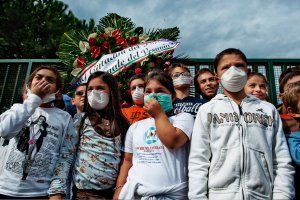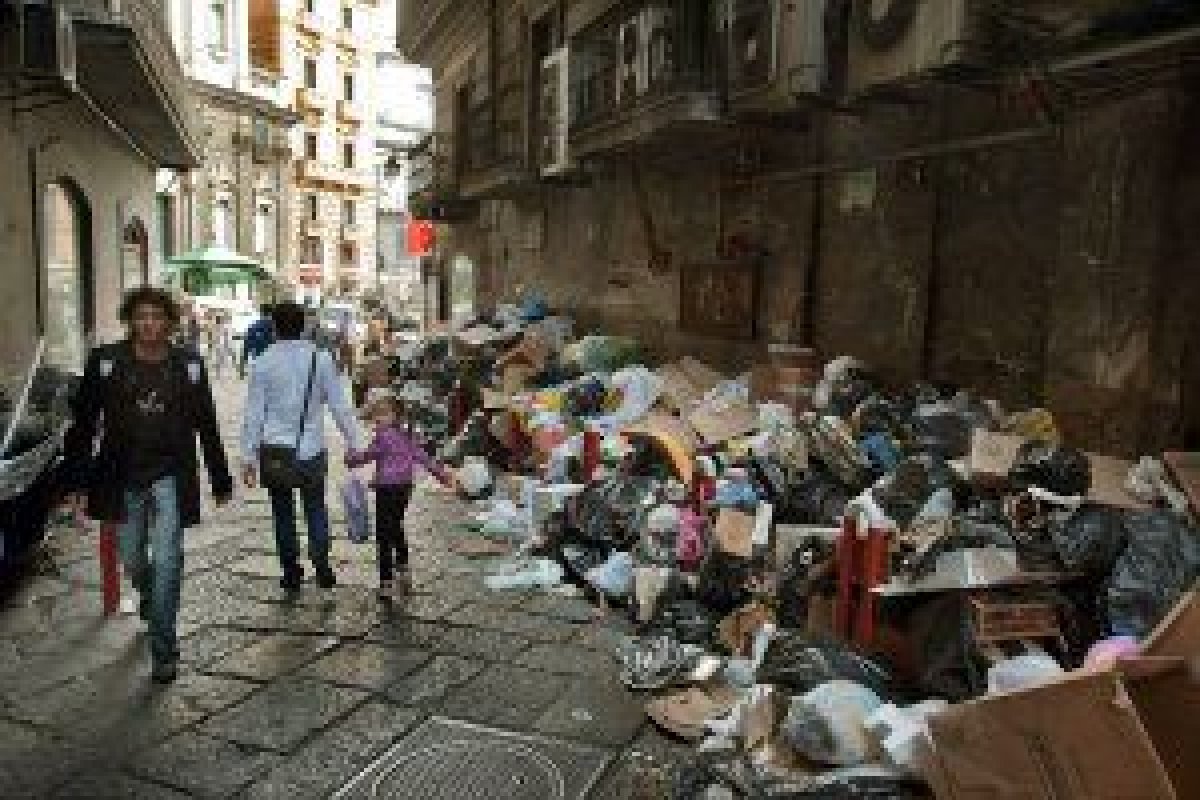
The pungency of 250,000 tons of rotting garbage is almost indescribable. "It is like a heavy, soiled blanket that smothers us each night," says Ferdinando Mosca, who owns a fruit shop across the street from the entrance to the Cava Sari landfill in Terzigno, Italy. "It burns your eyes. It closes your throat. The children vomit and cough. Our bodies are covered with rashes."
Mosca is not exaggerating. Since Prime Minister Silvio Berlusconi's election promise to solve the Naples garbage crisis nearly three years ago, the Cava Sari landfill has been used to hide the Italian government's unwillingness to confront the Camorra crime syndicate. Naples may be the face of the problem with widely circulated images of trash strewn in its streets, but environmentalists say the real problem is the illegal importation and dumping of toxic waste that make up a hefty multimillion-dollar business for the Camorra, which imports trash from all over Europe. As long as the Camorra keep the streets of Naples clean, no one stops whatever else they put in the landfill. Now, with the resurgence of the garbage issue, Berlusconi is facing new calls for his resignation and allegations that his government is in bed with the mob. "Berlusconi may have won his election on solving this garbage crisis," says Francesco Paolo Oreste, a special-unit police officer who has become a political advocate against the government's handling of the crisis. "Then he should lose his premiership because of it."
Because no one has bothered to control what goes into this putrid dump in Naples's Campania region, the people who live along its perimeter are paying the ultimate price. Rising rates of leukemia, throat cancer, and respiratory illnesses are a testament to the severe pollution of the air and water. They can't open their windows, and the children can't play outside because of the intensely sickening smell. No tourists come here, despite the picturesque landscape, and no one wants to buy any of the agricultural products grown in these fields. As if that's not enough, the landfill sits inside the Vesuvius National Park on the flanks of a live volcano. "We live in a tumor factory," says Oreste. "How can we accept that we have to pay for the Camorra's profits and the government's convenience with our health and that of our children? Enough with the trash. Enough with the lies."
Tensions hit a new high last week when the government announced it would go forward with plans to open an even bigger landfill nearby. The Cava Vitiello landfill is also being dug inside Vesuvius National Park, about nine miles from the Cava Sari site and will hold 3 million metric tons of trash. It will be the biggest landfill in Europe, and much of the rubbish, locals believe, will be illegally imported by the Camorra. Angry residents rioted at the news, torching garbage trucks and attacking police lines, injuring 20 officers. The riots temporarily halted the collection of garbage in Naples, which quickly led to overflowing bins and renewed international attention. "Every time the streets of Naples fill with garbage, our children pay the price here in Terzigno," says Nazara Gargiulio, a local teacher who heads the group Volcanic Mothers. "We are living under siege."

The focus may be on the streets in the city of Naples, which are relatively clean except for a few pockets of filth and overflowing bins, but it is in Terzigno where residents have reached their limit. Last week Berlusconi promised to clean up the streets of Naples within 10 days, which he did by diverting trash to neighboring landfills, but he can only keep up the façade by letting the garbage trucks return to the Sari landfill. Residents here say they will allow that only if the government starts controlling what gets dumped, and holding the Camorra, which has the ultimate control of these landfills, accountable. The tension is likely to reach its pinnacle Thursday or Friday night, when garbage trucks will again unload at Cava Sari. The police will escort the trucks in and out of the landfill, but residents say they will put up fierce resistance. "People here are desperate," says Mosca, fanning a fire he builds nightly in his parking lot to try to counter the smell from the landfill. "It's like they are trying to kill us. "
There is no clear answer to the problem. Imported toxic trash aside, Neapolitans produce more raw garbage than any other Italian city. Only 5 percent of Naples's 1 million residents recycle, even though there is a system in place to collect separated paper, plastic, and biodegradable organic waste. Unlike in Rome, Florence, and Milan, which have moderately successful recycling programs, no one enforces recycling measures in Naples, likely because trash is profitable. And when trash starts to pile up in residential streets, rogue collectors take it out to the countryside and burn or bury it, often paid by local residents' groups who don't want the trash in their backyard. "You have to change a mentality of an entire city that hasn't given a damn about what goes in their bins for decades," says a local protester called Gennaro who, along with hundreds of residents, has held a nightly vigil at a roundabout near the entrance to the Sari landfill for almost a month. "Vesuvius is the symbol of survival and strength, but Naples is clearly the symbol of everything wrong with this country."
Italy's civil protection authority, Guido Bertolaso, met with local mayors on Tuesday and promised to temporarily put on hold the opening of the Vitiello landfill, but only if the residents stopped their nightly protests. He also promised to try to diminish the rancid smell by covering the top layer of rotting trash inside the Sari landfill with compost to mask the odor. Oreste, the police officer, says he believes that the Camorra gangs have infiltrated the protests and will spur new violence, if only to ensure that the new dump opens, ensuring their profits. "The people here are not protesting against the police or government," he says. "They are protesting against the Camorra, who is being protected by both."
But Oreste says the government still needs to do more. It needs to finally stand up to organized crime and scrap the new dump plans altogether and give that land back for park use, he says. And officials also need to spend a week in Terzigno. "Berlusconi has no idea what his disastrous negligence smells like or looks like on a daily basis," Oreste says. "They come in and put a few Band-Aids on the problem to take the spotlight off. But those of us who live here know that underneath it all, it still stinks."
Uncommon Knowledge
Newsweek is committed to challenging conventional wisdom and finding connections in the search for common ground.
Newsweek is committed to challenging conventional wisdom and finding connections in the search for common ground.
About the writer
To read how Newsweek uses AI as a newsroom tool, Click here.








